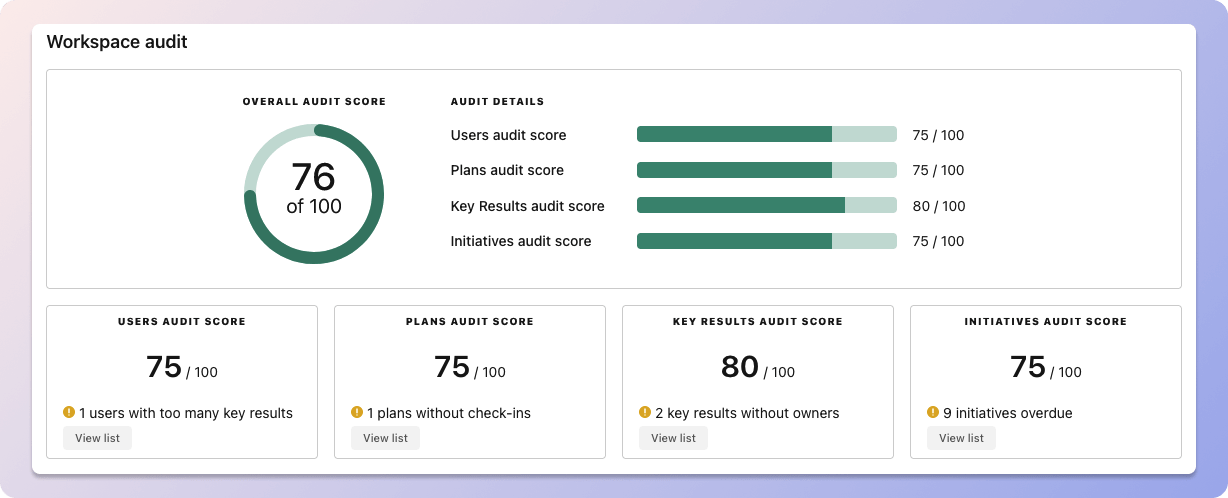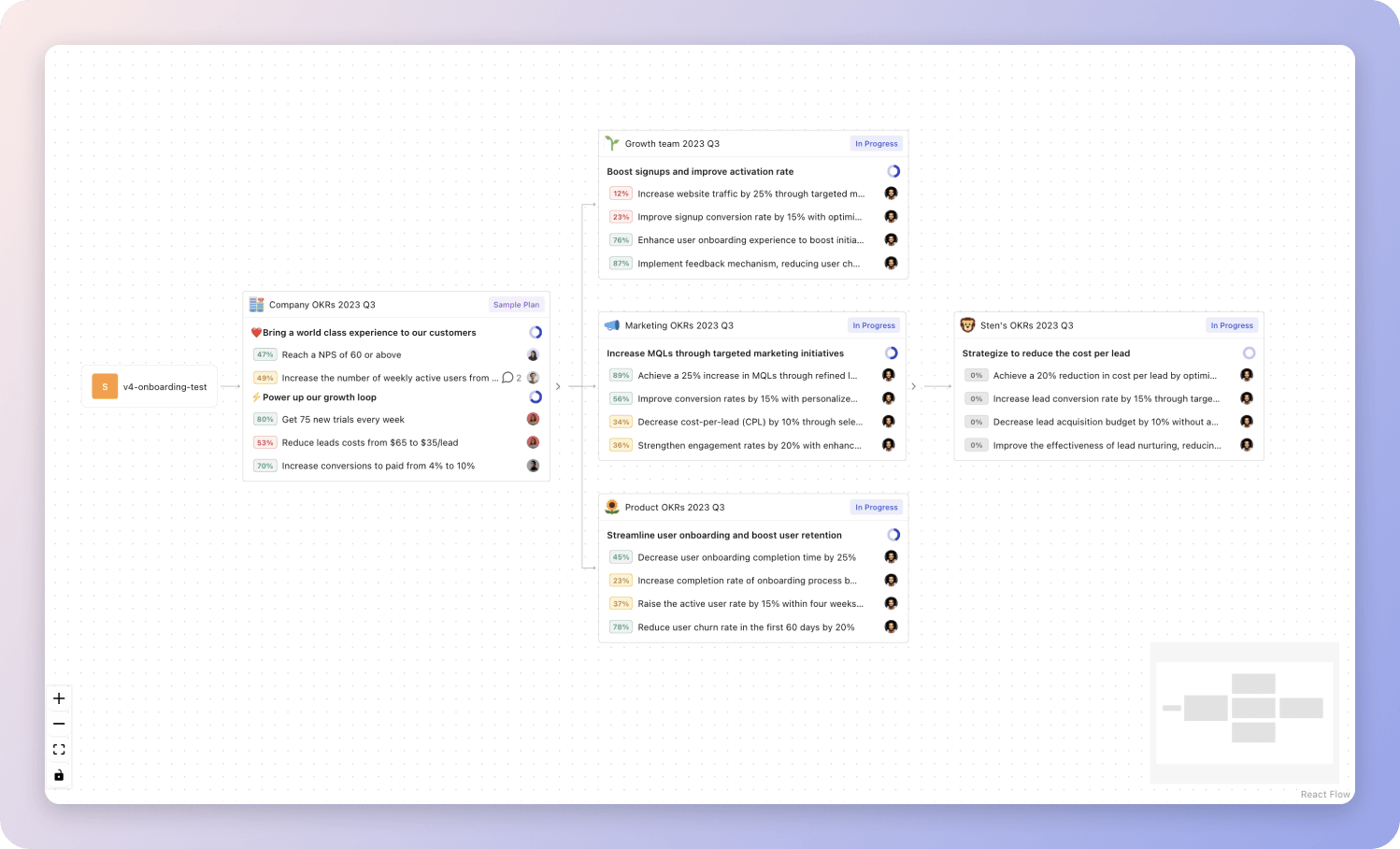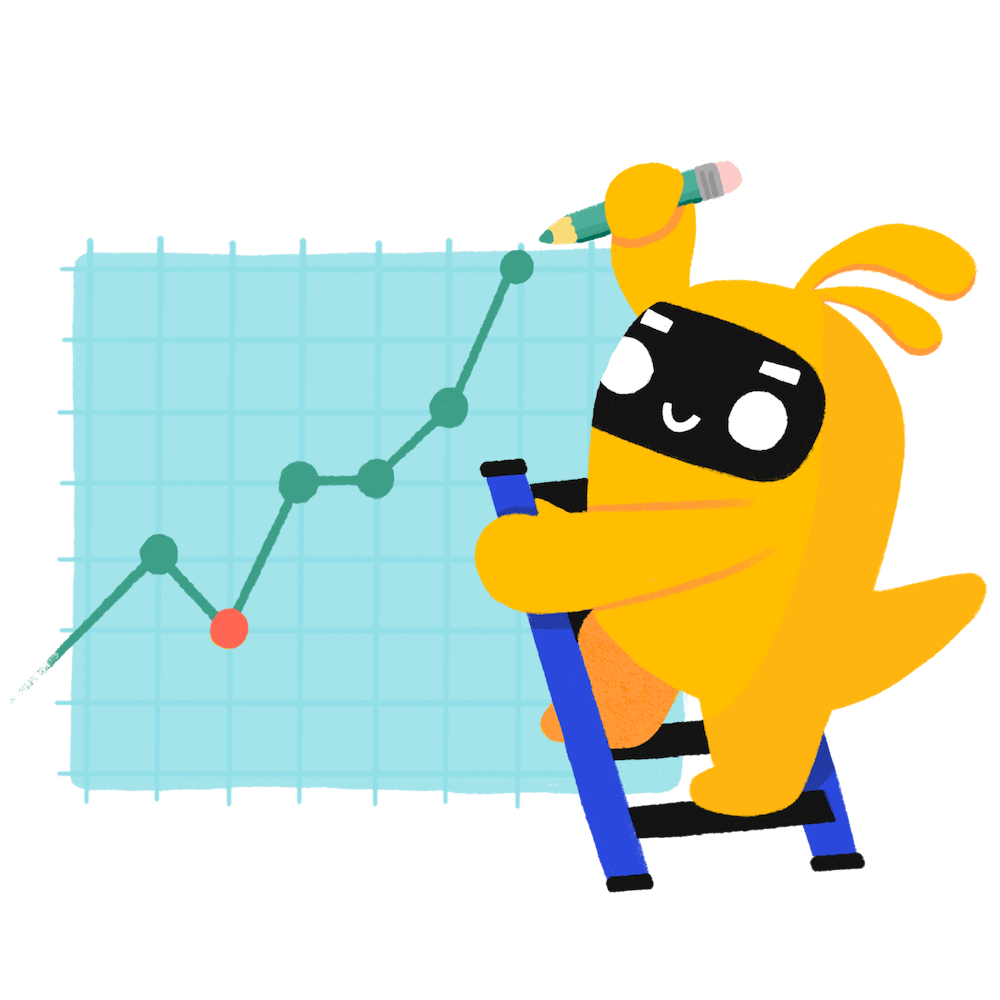11 customisable OKR examples for Task Management Team
What are Task Management Team OKRs?
The Objective and Key Results (OKR) framework is a simple goal-setting methodology that was introduced at Intel by Andy Grove in the 70s. It became popular after John Doerr introduced it to Google in the 90s, and it's now used by teams of all sizes to set and track ambitious goals at scale.
Crafting effective OKRs can be challenging, particularly for beginners. Emphasizing outcomes rather than projects should be the core of your planning.
We have a collection of OKRs examples for Task Management Team to give you some inspiration. You can use any of the templates below as a starting point for your OKRs.
If you want to learn more about the framework, you can read our OKR guide online.
Building your own Task Management Team OKRs with AI
While we have some examples available, it's likely that you'll have specific scenarios that aren't covered here. You can use our free AI generator below or our more complete goal-setting system to generate your own OKRs.
Feel free to explore our tools:
- Use our free OKR generator
- Use Tability, a complete platform to set and track OKRs and initiatives, including a GPT-4 powered goal generator
Our customisable Task Management Team OKRs examples
You'll find below a list of Objectives and Key Results templates for Task Management Team. We also included strategic projects for each template to make it easier to understand the difference between key results and projects.
Hope you'll find this helpful!
1. OKRs to improve time management and task prioritization
Improve time management and task prioritization
Increase productivity by completing 90% of priority tasks
Minimize distractions by creating a focused work environment
Use time blocking techniques to allocate dedicated time for priority tasks
Set clear and specific goals for each priority task
Prioritize tasks based on urgency and importance
Develop a daily schedule that ensures adequate time allocation for important tasks
Regularly review and adjust the daily schedule to ensure optimal time allocation
Minimize distractions by setting boundaries and establishing designated work areas or times
Allocate specific time blocks for each important task in the daily schedule
Identify and prioritize important tasks based on urgency and importance
Reduce time wasted on low-value activities by 50%
Identify low-value activities through a comprehensive analysis of daily tasks
Delegate low-value activities to appropriate team members for increased productivity
Implement time management techniques, such as prioritizing tasks and setting realistic deadlines
Continuously review and optimize processes to eliminate or automate low-value activities
Attend time management training to learn effective techniques
Research and find a suitable time management training program
Enroll in the selected time management training course
Implement and practice the learned time management techniques consistently
Actively participate and engage in all training sessions
2. OKRs to efficiently manage and coordinate the Trello board
Efficiently manage and coordinate the Trello board
Reduce overdue tasks on Trello by 20%
Prioritize and reassign less urgent tasks to the team
Implement daily reminders for due tasks
Enhance task management training for all team members
Improve response time to task updates on Trello to less than 1 hr
Set mobile notifications for immediate Trello task updates
Prioritize responding to Trello updates promptly
Schedule regular intervals to check Trello throughout the day
Increase task completion rate on Trello by 25%
Implement daily reminders for pending tasks
Enhance visibility of task deadlines
Conduct weekly task completion training sessions
3. OKRs to enhance time management by reprioritizing based on requests
Enhance time management by reprioritizing based on requests
Increase task completion by 20% through effective distribution of remodulated priorities
Analyze current priority system and identify areas for improvement
Develop a strategy for redistributing tasks based on priority
Implement process change and monitor improvements in task completion
Reduce weekly time inefficiencies by 15% using focused priority remodulation
Implement a time tracking system to discover inefficiencies
Identify and analyze current tasks regularly for priority assessment
Adjust work processes based on priority and efficiency data
Successfully reschedule 90% of misaligned priorities within 48 hours of request receipt
Prioritize requests, aligning them to current goals
Allocate resources to resolve each request efficiently
Review all received rescheduling requests accurately
4. OKRs to boost capabilities in efficient time management
Boost capabilities in efficient time management
Reduce procrastination and wasted time to less than one hour per workday
Limit social media use during work hours
Prioritize tasks using a to-do list
Set specific, manageable daily goals and deadlines for tasks
Successfully complete 100% of projects earlier than the deadline indicated
Periodically revisit timelines and adjust as necessary
Start projects early to maximise working timeframe
Improve efficiency with consistent daily progress
Read and finish at least two industry-recognized books on time management strategies
Choose two reputable time management books
Summarize key time management strategies learned
Create a reading schedule to meet deadline
5. OKRs to enhance team collaboration through synergizing efforts
Enhance team collaboration through synergizing efforts
Facilitate 3 team-building activities resulting in improved team communication score by 35%
Organize and execute three selected team-building activities
Research effective team-building exercises focused on communication skills
Evaluate team communication score after each activity
Boost project completion rate by 20% through implementing collaborative tools
Monitor and evaluate tool usage and project progress
Train team members on using new tools effectively
Research and select appropriate collaborative tools
Reduce task redundancy by 30% through improved coordination and process enhancement
Conduct regular meetings for enhanced intra-team coordination
Review and streamline work processes for better productivity
Implement a system for efficient task allocation across teams
6. OKRs to improve software engineering skills through effective time management
Improve software engineering skills through effective time management
Increase the number of completed coding tasks by 20% each week
Identify and address any obstacles or challenges that may hinder coding task completion
Enhance collaboration and communication among team members for efficient task completion
Provide regular feedback and support to assist in completing coding tasks
Set clear and achievable coding task goals for each team member
Improve adherence to project deadlines by delivering work on time in 90% of cases
Implement effective communication strategies to address obstacles and ensure timely completion
Set clear and realistic deadlines for each project task
Prioritize tasks and create a detailed schedule to ensure timely delivery
Regularly track progress and provide updates to stakeholders to maintain accountability
Reduce time spent on non-essential activities by 15% during work hours
Set specific time limits for non-essential tasks to ensure efficient completion
Prioritize and eliminate non-essential activities based on their impact and importance
Identify non-essential activities taking up significant time during work hours
Regularly assess and adjust the allocation of time to non-essential activities as needed
Attend and actively participate in at least 2 time management workshops or webinars
Research and identify 2 time management workshops or webinars
Apply the learned time management techniques in daily activities for improved efficiency
Take thorough notes during the workshops or webinars for future reference
Register for the selected workshops or webinars to secure a spot
7. OKRs to boost the billability rate of employees to 95%
Boost the billability rate of employees to 95%
Implement a time-tracking software to reduce unproductive time by 15%
Train all employees on how to use this software
Research and select a suitable time-tracking software
Monitor and evaluate the software's effectiveness regularly
Reduce non-billable task assignments by 20% through efficient delegation strategy
Implement a strict task monitoring system
Train staff on effective task delegation strategies
Analyze current delegation methods for efficiency problems
Provide productivity boosting training to achieve at least 10% more billable hours
Monitor and measure training effectiveness
Identify relevant productivity boosting training programs
Allocate resources and schedule training for team
8. OKRs to successfully complete project within the allotted time frame
Successfully complete project within the allotted time frame
Achieve 50% of project milestones by half of the designated period
Regularly monitor and adjust task progress
Develop a detailed project timeline
Identify and break down all project milestones
Finalize, review and submit complete project one week before the deadline
Submit completed project a week ahead
Thoroughly review completed project for errors
Finalize all aspects of the project
Define and delegate tasks clearly to every team member within 1st week
Assign tasks to the individual team members based on their skills
Identify tasks needed to achieve our team's current goals
Define each task's requirements and objectives clearly
9. OKRs to successfully complete the audit within the designated timeframe
Successfully complete the audit within the designated timeframe
Progressively accomplish 30% of the audit work each month until completion
Monitor weekly progress towards 30% completion
Adjust task allocation based on progress
Establish a weekly schedule for audit tasks
Address and resolve all audit findings and reports by the final week
Review all audit findings and reports promptly
Develop resolutions for each identified audit issue
Implement solutions before the final week
Create a thorough, realistic, and achievable audit plan within the first week
Evaluate and allocate necessary resources
Develop and finalize the audit methodology
Identify objectives and scope of the audit plan
10. OKRs to eradicate procrastination and bolster productivity for superior daily results
Eradicate procrastination and bolster productivity for superior daily results
Increase individually-assessed productivity score by 30% by quarter's end
Implement time management strategies to boost workflow efficiency
Encourage regular breaks to maintain focus and motivation
Set clear, attainable individual performance goals
Improve task completion rate by 90% compared to previous quarter
Implement advanced productivity tools to streamline workflow
Enforce strict deadlines and foster accountability
Identify and eliminate frequent causes of task interruptions
Reduce wasted time—defined as unproductive activity—by 50% per week
Identify and eliminate unnecessary tasks in daily routine
Use productivity tools to streamline work processes
Allocate specific time slots for each task
11. OKRs to to efficiently deliver tasks with minimal supervision under high-pressure scenarios
To efficiently deliver tasks with minimal supervision under high-pressure scenarios
Increase output speed by 20% without raising the error frequency above 5%
Implement efficient time management strategies
Improve staff training for optimized performance
Upgrade to faster, error-reducing software
Complete 100% of tasks independently, without requesting external assistance
Plan and prioritize work to manage time efficiently
Review completed tasks thoroughly to ensure quality
Develop knowledge and skills to handle given tasks properly
Handle 3 high-pressure situations efficiently, with positive feedback on performance
Create a prioritization system for managing high-pressure tasks effectively
Develop stress management techniques for handling high-pressure situations
Implement regular performance reviews to ensure positive feedback
Task Management Team OKR best practices to boost success
Generally speaking, your objectives should be ambitious yet achievable, and your key results should be measurable and time-bound (using the SMART framework can be helpful). It is also recommended to list strategic initiatives under your key results, as it'll help you avoid the common mistake of listing projects in your KRs.
Here are a couple of best practices extracted from our OKR implementation guide 👇
Tip #1: Limit the number of key results
The #1 role of OKRs is to help you and your team focus on what really matters. Business-as-usual activities will still be happening, but you do not need to track your entire roadmap in the OKRs.
We recommend having 3-4 objectives, and 3-4 key results per objective. A platform like Tability can run audits on your data to help you identify the plans that have too many goals.
 Tability's audit dashboard will highlight opportunities to improve OKRs
Tability's audit dashboard will highlight opportunities to improve OKRsTip #2: Commit to weekly OKR check-ins
Don't fall into the set-and-forget trap. It is important to adopt a weekly check-in process to get the full value of your OKRs and make your strategy agile – otherwise this is nothing more than a reporting exercise.
Being able to see trends for your key results will also keep yourself honest.
 Tability's check-ins will save you hours and increase transparency
Tability's check-ins will save you hours and increase transparencyTip #3: No more than 2 yellow statuses in a row
Yes, this is another tip for goal-tracking instead of goal-setting (but you'll get plenty of OKR examples above). But, once you have your goals defined, it will be your ability to keep the right sense of urgency that will make the difference.
As a rule of thumb, it's best to avoid having more than 2 yellow/at risk statuses in a row.
Make a call on the 3rd update. You should be either back on track, or off track. This sounds harsh but it's the best way to signal risks early enough to fix things.
How to turn your Task Management Team OKRs in a strategy map
The rules of OKRs are simple. Quarterly OKRs should be tracked weekly, and yearly OKRs should be tracked monthly. Reviewing progress periodically has several advantages:
- It brings the goals back to the top of the mind
- It will highlight poorly set OKRs
- It will surface execution risks
- It improves transparency and accountability
Spreadsheets are enough to get started. Then, once you need to scale you can use a proper OKR platform to make things easier.
 Tability's Strategy Map makes it easy to see all your org's OKRs
Tability's Strategy Map makes it easy to see all your org's OKRsIf you're not yet set on a tool, you can check out the 5 best OKR tracking templates guide to find the best way to monitor progress during the quarter.
More Task Management Team OKR templates
We have more templates to help you draft your team goals and OKRs.
OKRs to use Content Marketing for growth
OKRs to boost the income of the flight training academy
OKRs to promote and cultivate a diverse and inclusive workplace culture
OKRs to integrate AI tools into everyday work procedures
OKRs to expand reach through paid advertising with 30% more impressions
OKRs to strengthen the company's network security defenses
OKRs resources
Here are a list of resources to help you adopt the Objectives and Key Results framework.
- To learn: What is the meaning of OKRs
- Blog posts: ODT Blog
- Success metrics: KPIs examples
Create more examples in our app
You can use Tability to create OKRs with AI – and keep yourself accountable 👀
Tability is a unique goal-tracking platform built to save hours at work and help teams stay on top of their goals.
 1 Create your workspace
1 Create your workspace 2 Build plans in seconds with AI
2 Build plans in seconds with AI 3Track your progress
3Track your progress